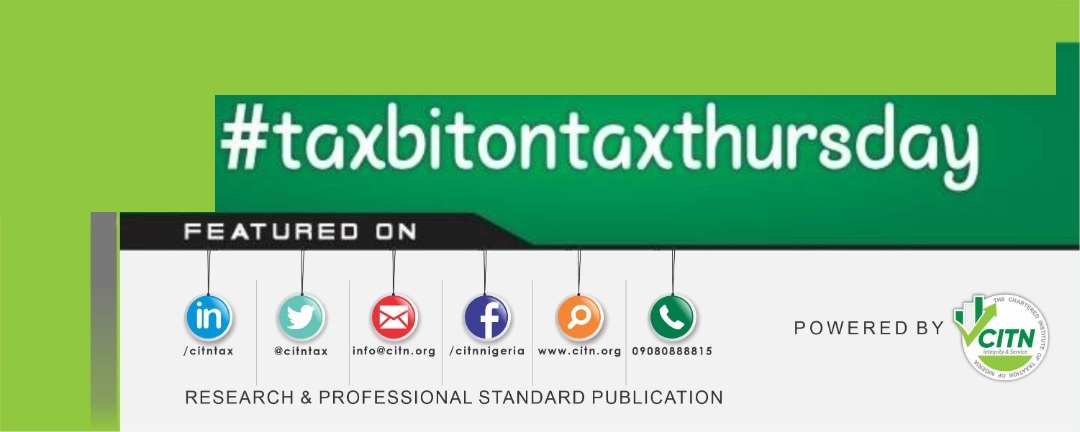- Have any questions?
- 09080888815
- 092918349
- citn@citn.org
EVOLUTION OF THE NIGERIA DIGITAL CURRENCY: THE e-NAIRA (Part 1)

ADMINISTRATION OF STAMP DUTIES IN NIGERIA (CONCLUDING PART)
October 9, 2021
Overview of CITN Statement of Taxation Standards (STSs)
October 14, 2021EVOLUTION OF THE NIGERIA DIGITAL CURRENCY: THE e-NAIRA
What is digital currency?
Digital currency is any form of money or payment that exists solely in electronic form. It does not have a tangible form such as a bill, cheque, or coins and is accounted for and transferred using electronic codes in computers. As technology becomes increasingly prominent, payments are becoming more digital, resulting in less use of tangible money. New forms of technology now allow for more secure and seamless use of digital currencies. Digital currency can be transferred and exchanged with technologies like credit cards, smartphones, and online cryptocurrency exchanges.
The history of digital currency dates back to the invention of the internet. There were difficulties in getting the population to adopt the use of digital currency in the early days; however, as people become more comfortable with technology, and the technology itself becomes more safe and secure, more people are now willing to utilize digital monies. PayPal is considered one of the first successful companies to bring the idea of easy-use digital financial transactions to mass adoption. Prominent examples of digital currency include Bitcoin, Ethereum, Ripple and Litecoin, amongst others. Central bank’s digital currency (CBDC) is another form of digital currency that are gaining global adoption and acceptance. The CBDC is the virtual format of a fiat currency for a particular nation or region. It is an electronic record or digital token of the official currency and is issued and regulated by its monetary authority. Many countries such as China, the US, England, Canada and Russia have taken concrete steps towards issuing a virtual format of their official currencies.
Digital currencies have assisted in the globalization of economies around the world since trade is made more easily by sending and receiving digital currency. It eliminates the need to physically transfer money; furthermore, banking is made much more convenient by allowing people to perform their banking without the need to visit a physical branch or carry cash.
On the other hand, banks are reducing their retail employee headcount to meet the trend of digital currency. Many branches are closed since they become redundant when more people increasingly bank with digital currency. It comes at a cost, however, as the banks are not able to maintain personal relationships with customers and create any sort of loyalty. In addition, banks cannot cross-sell their other products without in-person sales opportunities.
The Central Bank of Nigeria (CBN) launched the official website of its digital currency, the e-Naira, on the 24th of September 2021. The digital currency was launched as Nigeria’s alternative to the more prevalent currencies like bitcoins and cryptocurrencies. The currency is set to have an app that is currently unavailable for download. The e-Naira is set to serve as both a medium of exchange and a store of value, offering better payment prospects in retail transactions when compared to cash payments. The currency has an exclusive operational structure that is both remarkable and nothing like other forms of central bank money.
Benefits of adopting the e-Naira
The CBN explained that eNaira users will benefit from the website’s simplified financial transactions, according to a statement that noted that users will be able to send money to one another using a linked bank account or credit card. It will also allow customers the ability to transfer money from their bank account to their e-Naira wallet with ease. The currency creates easy access to financial services in remote areas that have suffered financial exclusion for years. Also, it enables the government to send direct welfare allowance to citizens and communities that are beneficiaries of such interventions and facilitates instant cross-border foreign exchange which boosts the economic growth of the nation. It offers bank customers the opportunity to monitor their e-Naira wallet, check balances, view transaction history; and customers will be able to make in-store payments using their e-Naira wallet by scanning QR codes. In addition, customers are allowed to scan the QR Code on the website to get started.
Challenges confronting the use of Digital Currency
One significant risk that can be attributed to the increasing use of digital currency is payment fraud which can be committed in many forms. However, in general, it includes fraudulent or unauthorized transactions completed by a cybercriminal. Some common forms of payments fraud include:
- Fraudulent payments
- Illegal payments
- Internal manipulation
- Data theft
- Breach of embargos and sanctions
Because money is not transferred physically, it is impossible to know who is on the other side of a transaction. It gives rise to opportunities for cybercriminals to gain access to sensitive information or scam people through digital currency.
Although payment security has been increasing, the complexity of which cyber criminals commit fraud is becoming increasingly complex as well. Payments fraud activity is continuing to rise, and it shows no signs of declining.
Modern-day cyber criminals are becoming craftier than ever, continuously exploiting new weaknesses and devising different methods of manipulating digital currency. Scammers are very persistent in their efforts to attack payment systems. If they face challenges on a particular method, they will just pivot and shift their focus to alternative payment methods.
Conclusion
The government needs to design a well-thought-through framework for the administration of the e-Naira. Being a legal tender, the digital currency has huge potentials including the capacity to improve the value of the Naira and bring about an increase in government revenue due to the ease of concluding transactions, especially across borders.



